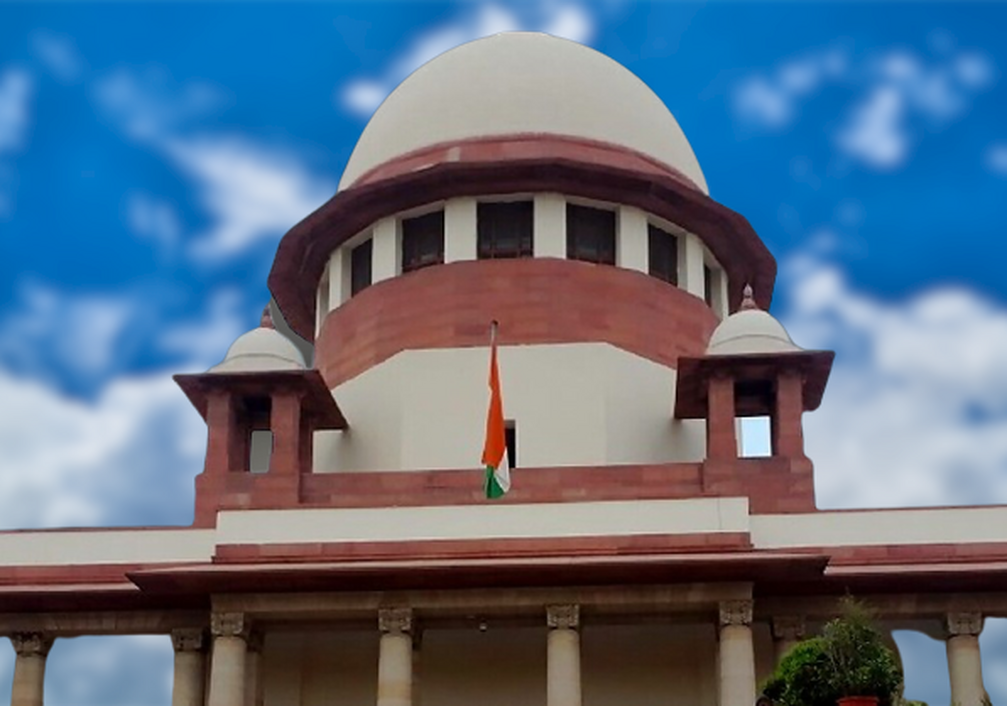In Criminal Appeal No.1578 of 2012 -SC- Supreme Court confirms convictions in 1988 murder case citing failure to prove alibi
Justice Abhay S. Oka & Justice Sanjay Karol [10-10-2023]

Read Order: Kamal Prasad & Ors. V. The State of Madhya Pradesh (Now State of Chhattisgarh)
Chahat Varma
New Delhi, October 11, 2023: The Supreme Court has upheld the convictions of three convicts in a 1988 murder case, dismissing their appeal and holding that the prosecution case was proven beyond reasonable doubt.
In the case at hand, three convicts, namely, Kamal Prasad (A-3), Shersingh (A-6), and Bhavdas (A-9), had been convicted of committing an offense punishable under Sections 148, 302 read with 149, 307 read with 149, Indian Penal Code, 1860 (IPC), and Sections 4/5 of the Explosive Substance Act, 1908. The present appeal was made to question the correctness of a judgment and order passed by the Chhattisgarh High Court, by which the guilt of the accused had been confirmed.
The brief facts of the case were that on 17.04.1988, Chetram was taking his son, Kapildeo, to the hospital for treatment, with Choubisram (PW-3) riding pillion on the vehicle. When they reached the house of the accused, a group of 11 individuals attacked them using homemade bombs, as well as sticks and a tabbal. Chetram sustained multiple injuries during the attack and lost his life. PW-3 managed to escape the assault. Kapildeo, Chetram's son, while receiving medical treatment, also succumbed to his injuries.
In the trial, the court considered the evidence presented by both the prosecution and the accused, with the accused attempting to establish their alibi. After careful examination, the Trial Court found the prosecution's evidence to be reliable, and the witnesses were able to establish the prosecution's case beyond a reasonable doubt. The testimonies of the witnesses were deemed to be of high quality, and their credibility remained unchallenged. Consequently, the Trial Court convicted nine out of the eleven accused individuals. Subsequently, the convicted individuals filed an appeal challenging their convictions. However, the findings of fact, the reasoning adopted by the court, and the judgment of conviction along with the resulting sentences were affirmed and upheld by the High Court.
Before the Supreme Court, the convict-appellants challenged the impugned judgment on four main fronts: (a) disputing the inordinate delay in filing the First Information Report (F.I.R.), (b) contesting the reliability of the prosecution witnesses' testimonies due to alleged contradictions, (c) suggesting an alternative motive for the crime, given the deceased's history of pending cases, and (d) presenting an alibi, claiming that they were not present at the crime scene.
Regarding the first contention, the division bench of Justice Abhay S. Oka and Justice Sanjay Karol took note of the fact that the FIR had been registered approximately two hours after the incident occurred. The testimony of PW-3, who played a crucial role in having the FIR filed, indicated that due to fear and having suffered multiple injuries, he had fled the scene and hid, only emerging two hours later. The bench concluded that, under these circumstances, the delay in filing the FIR could not be deemed fatal to the prosecution's case, especially given the injuries sustained by the witness, the remote location of the village where the incident took place, and the fact that the police obtained their account of events only after they reached his place of hiding. It was established that this was not a case of prior consultation, discussion, deliberation, or attempts to fabricate the story.
In relation to the plea of alibi, the bench noted that the plea of alibi does not fall under the General Exceptions outlined in the IPC; rather, it is regarded as a rule of evidence as per Section 11 of the Indian Evidence Act, 1872. The responsibility to prove the plea lies with the party making such a claim. This burden must be met by presenting compelling and satisfactory evidence, and a 'strict scrutiny' standard is applied when evaluating such pleas.
The bench ruled that the defence witnesses did not definitively prove the plea of alibi, as their statements lacked corroboration from any other supporting evidence, and did not meet the standard of preponderance of probability.
“We find that for the plea of alibi to be established, something other than a mere ocular statement ought to have been present,” said the court.
The bench further concluded that there was no merit in the argument that the testimonies upon which the prosecution relied were inherently contradictory.
Further, the bench emphasized that merely citing the deceased's history of previous run-ins with the law should not automatically benefit those accused of his murder. Such claims, especially when they are unsupported by concrete evidence, are considered presumptuous.
In conclusion, the court determined that the charges brought against the convict-appellants along with the sentences imposed by the Trial Court and upheld by the High Court, did not justify any intervention by this court.
Accordingly, the appeal was dismissed, and the bail previously granted by the court was cancelled. The convict-appellants were instructed to surrender immediately.
Sign up for our weekly newsletter to stay up to date on our product, events featured blog, special offer and all of the exciting things that take place here at Legitquest.




Add a Comment